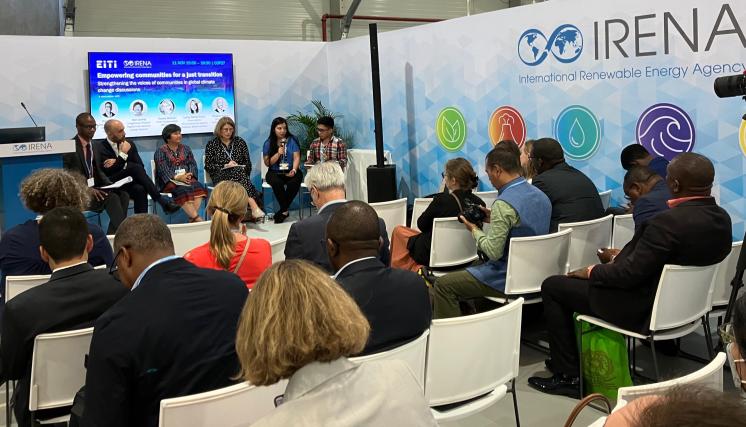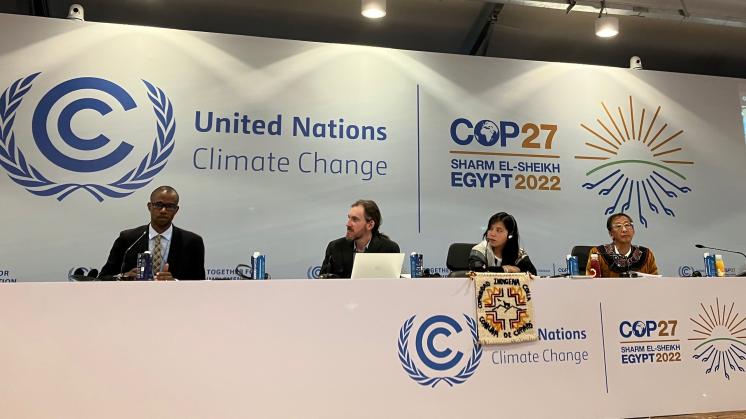
Peeking behind the COP27 curtain: Why resource governance matters for a just transition
In an increasingly polarised world, global standards such as the EITI can play a critical role in promoting a just and fair energy transition.
Climate justice was top of the agenda at this year’s United Nations Climate Change Conference, where high-level negotiations culminated in a historic agreement to establish a loss and damage fund for vulnerable countries affected by climate-related disasters.
Now comes the hard part: how to incentivise global cooperation and avoid yet another broken promise?
When it comes to addressing global inequalities, a global standard for the good governance of natural resources must be a part of the equation. Yet the governance and corruption dimensions of mining and energy projects are still getting little attention. International bodies, governments, businesses and civil society should not ignore the governance, environmental and social challenges presented by the global shift to a low-carbon economy.
An energy transition that benefits everyone
There is a growing recognition of the need to respect the rights of communities living near fossil fuel, transition minerals and renewables projects. But balancing the urgency of global climate action with the rights of communities remains a tricky dilemma. A significant share of the minerals needed for the energy transition is located in low and middle-income countries, often in environmentally and socially sensitive areas. According to the EITI’s latest report, 80% of transition minerals projects in EITI implementing countries are located on territories of indigenous and land-connected communities, and 50% overlap with conservation areas.
A case in point is the impact that lithium mining has had on indigenous communities in Chile, as was highlighted at a COP27 side event on empowering communities for a just transition, co-hosted by the EITI and the International Renewable Energy Agency (IRENA). This example illustrates the importance of including stakeholders whose livelihoods are directly impacted – including the most vulnerable – in decision-making on extractive and energy projects.
When it comes to addressing global inequalities, a global standard for the good governance of natural resources must be a part of the equation.
While the energy transition can bring opportunities for local revenue streams, jobs and community investments, it also comes with substantial risks. As emphasised at a COP27 panel on the real cost of just energy transition, communities need access to relevant data and a voice in the decisions that impact them. To this end, the EITI provides a platform for dialogue to ensure that the interests of communities are better represented.

A balancing act
The need for a rapid transition to renewable sources of energy, while also increasing energy access, was a major theme at COP27. Indeed, many nations are grappling with the challenge of balancing decarbonisation goals with energy security and economic development priorities.
This is particularly relevant in many African countries that seek to develop their resources and in European countries, which seek to secure long term supplies of natural gas. The second EITI Africa Energy Dialogue, held last month, saw frank exchanges among government and industry leaders on considerations for African countries as they face increasing pressure by international actors to transition away from fossil fuels.
As demand for oil and gas shifts, resource-rich countries will need to plan for the economic implications of the transition, especially where public revenues are at risk. A study by the Carbon Tracker Initiative highlights that further investments in fossil fuels could result in a missed opportunity for Africa to develop its economic potential in the renewables sector.
An anticipated transition minerals boom
According to the EITI’s latest report, a substantial part of the growing demand for transition minerals will likely be satisfied by EITI implementing countries, many of which hold large shares of identified mineral reserves and resources.
For countries like the Democratic Republic of the Congo, good governance is key to translating growing demand for transition minerals into sustainable development outcomes. This was underscored by the DRC government at a side event co-hosted with the EITI, ICMM, and the Natural Resource Governance Institute (NRGI). Governance and corruption risks need to be taken seriously if Africa’s mineral endowments are to be leveraged to promote the UN’s Sustainable Development Goal 7, as was highlighted during a discussion hosted by the Africa-EU Energy Partnership.
A substantial part of the growing demand for transition minerals will likely be satisfied by EITI implementing countries, many of which hold large shares of identified mineral reserves and resources.
The call to action for strengthening mining governance extends beyond Africa. Indonesia and the Philippines account for nearly half of the world’s nickel output, and global lithium reserves are mostly concentrated in South America. Global standards such as the EITI can support governments as they seek to stay ahead of the anticipated minerals boom.

The rise of renewables
As the development of low-carbon energy technologies gathers pace, massive amounts of capital will be spent in a short time frame. Urgent collective action is needed to mitigate against corruption risks in the renewables sector, and we can draw on lessons learned from the extractive industries. According to the U4 Anti-Corruption Resource Centre, an investment rush can give way to multiple forms of corruption in the renewables sector. Weak governance and rigorous due diligence regulations could deter investments and disadvantage “high-risk” producer countries, further deepening the divide between low and high income-countries.
If not managed well, renewable investments – particularly for emerging technologies like green hydrogen – can exacerbate corruption risks in environments where legal and institutional frameworks are not well developed. A rush in demand can lead to deteriorating regulatory safeguards, which in turn can facilitate corruption such as institutional capture, rent-seeking, nepotism, bribery, tender-rigging and collusion.
Urgent action is of essence at this critical juncture. As the global community seeks to transition to a low-carbon future that is inclusive, sustainable and just, a multi-stakeholder approach will be key to ensure that no one gets left behind.
Related content





